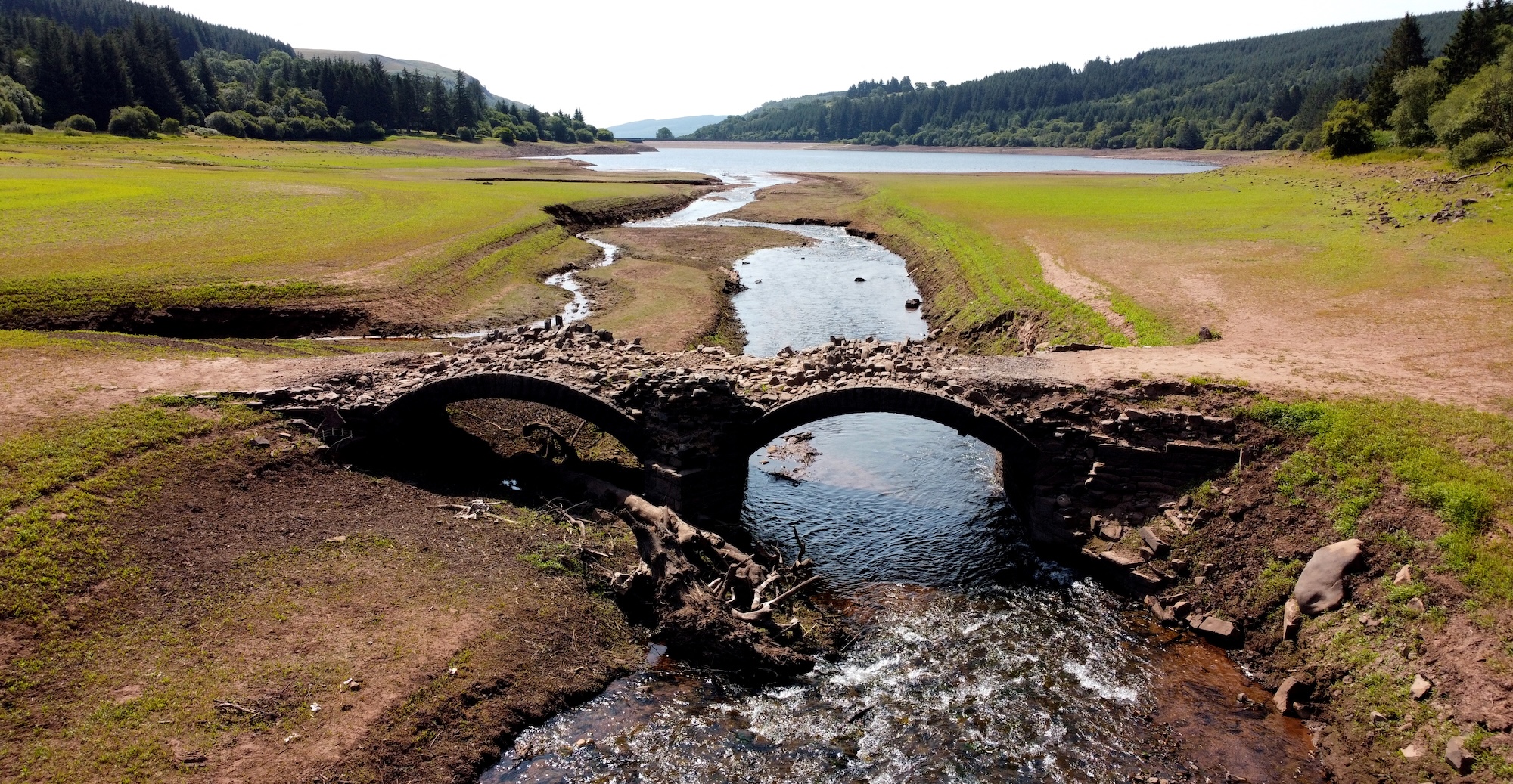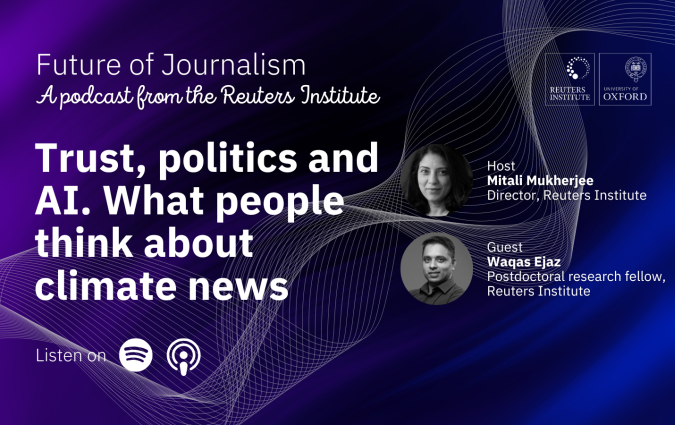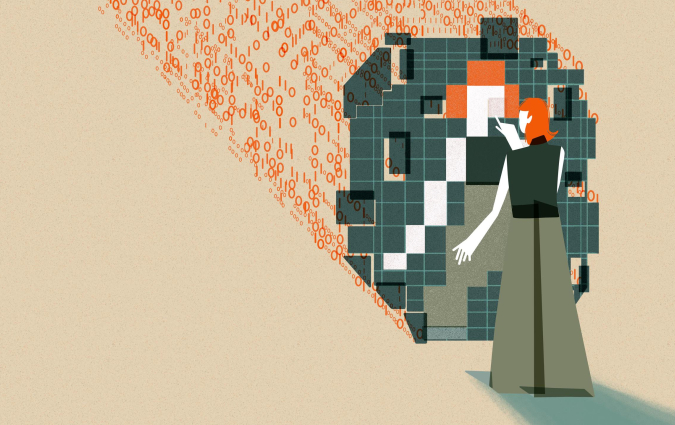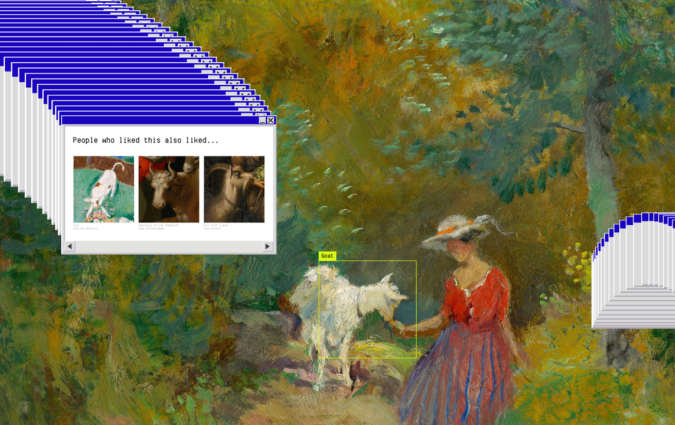From despair to purpose: Six climate reporters on how to protect their mental health

A view of a bridge, which is usually submerged, over the dried bed of Llwyn-on Reservoir during a heatwave in Wales, Britain on 18 July 2022. REUTERS/Carl Recine
What is climate journalism doing to us? This is a question that always invokes deep, thoughtful and powerful conversations among the growing community of nearly 700 practicing journalists and editors who have been part of the Oxford Climate Journalism Network.
Research has focused so far on the psychological impacts for reporters covering conflict, but not climate change. Anecdotally, we know that this conversation is huge – and in need of urgent acknowledgement. But there was very little data on this until now.
World-leading psychiatrist Dr Anthony Feinstein presented preliminary findings from his research into this topic at an event we hosted on 22 May at the Institute.
Here are some standout findings:
- 63% report mental health is not taken seriously by their newsrooms.
- 55% have no access to resources to support their mental and physical health.
- 16% of people have taken a break from work due to mental health reasons.
- 30% of the sample directly affected by climate change: loss of a family member / friend / home / had to be evacuated.
- 26.5% harassed because of their climate change work.
- 83% feel there is a positive psychological aspect to their work.
- 73% believe their work is influencing the discussion on climate change.
- Emotional responses to climate change work (in order of severity and frequency): Despair, anger, guilt, disgust and shame. These are symptoms of moral injury.
- Almost half reported moderate to severe symptoms of anxiety (48%) and depression (42%).
In this piece we explore the human stories behind this data. Six journalists, all members of our climate network, discuss their experiences and the impact of climate journalism on their mental health. I am deeply grateful for their candor and their openness about their work.
Damage in the aftermath of Hurricane Dorian in Bahamas in September 2019. Journalist Seigonie Mohammed covered this devastating weather event. REUTERS/Dante Carrer
Seigonie Mohammed
Senior News Anchor and lead producer, TTT Limited
Trinidad and Tobago
From hurricanes to severe floods, I’ve covered traumatic events in the Caribbean and I’m passionate about this topic. These weather events often happen back-to-back. These are now perennial problems in the region.
In the beginning my family life suffered significantly. I didn't know how to talk to them about some of the stories I was working on.
I’ve struggled being the only woman doing what I do in multiple newsrooms. It is a daunting task, and not for the faint of heart!
You don’t have a lot of people [reporting on climate change], and therefore it’s hard for you to be able to relate to someone else on a different beat. They are not functioning the same way that you are.
While covering the climate crisis, journalists are dealing with many emotional issues. We see people going through loss time and time again, whether that’s for their livelihood, property or family members. We are trying to communicate that to our audience, and doing that is almost like regurgitating this trauma. You are living it over yourself, but you're also taking your entire nation through this trauma. That was really emotionally upsetting for me at one point, because there’s this sense of helplessness.
Going back to impacted areas created a significant amount of anxiety. I’d be thinking ‘What am I going to see now? Is the house I left a month ago still standing? How are those people coping now?’ That was a big challenge, alongside trying to maintain my composure. I still had to function, because it was my duty.
At one point I was personally impacted by flooding. I had to leave my job and come home and figure out what was happening. Now it was my story.
It took me a while to strike that balance between empathy and professionalism. It was mentally draining.
Burnout is very real too. I suffered really badly. I’m the only one in Trinidad and Tobago who fainted live on television! I was suffering significant burnout. It was hurricane and rainy season and I just wanted to get every story that I could. I was coming in six hours before my shift, and leaving later, and doing it for 10-12 days. It was hard to learn where and when to say ‘No’, and control the urge to be there always covering the story.
Topics like this are considered taboo. We have this culture, especially among our men, that if you talk about your feelings and emotions you’re considered weak. People in the office see you as someone ‘crazy or incompetent’ and they don’t want to interact with you as much. On top of that, our organisations don't really put things in place for us to have the conversation.
It’s essential that we advocate for our own wellbeing. Some people can build safe spaces. It may not be within your own country but perhaps regional or international. Having that network of support helps.
Solutions journalism has also helped me to grow. Now I understand we can bring hope to audiences. Even in a story that is dull, dreary and gloomy, we can still find hope and resilience for our own people.
I used to have a lot of fear, but now I’m okay. I can talk to people so they can realise that there’s someone just like them going through the same things.
Alam’in Umar
Conflict and climate change journalist with HumAngle
Nigeria
Reporting on climate change here in Nigeria is to see how it intersects with conflict, displacement and poverty. Speaking sincerely, it’s very draining. The people I report on are just any kind of people. Sometimes even people I knew while growing up as a child. So this is personal to me.
When reporting on these issues, I realised that what I’m doing is just reporting, not changing the impact on them. Knowing I’m helpless makes me feel a bit guilty. Most of these communities are in conflict zones. So anytime I’m there, I am always vigilant.
At HumanAngle, we have an in-house clinical psychologist. Whenever we experience mental stress and anxiety, she’s there to help. Other than that, I have this circle of friends in the office, so someone is always there to listen, including my editor, whom I talk to at length.
So I have a circle that includes my friends, my family, my editors and a psychologist. This is something that I want to see replicated across media organisations, not just in Africa but all over the world.
Meghie Rodriguez
Freelance science and environmental journalist
Brazil
It’s possible to deliver balanced coverage on climate change, but it’s difficult to keep your distance from climate change, because it’s not something happening to someone else – it’s happening to all of us. It’s happening to future generations.
I’ve been trying to keep some hope and bring this hope to people. Otherwise, you would just want to stay in bed!
I recently worked on a podcast story about tailing dams [dams built to hold mine waste]. We’ve had terrible environmental disasters from the rupture of dams in Brazil. There are places where these dams are sitting above the heads of people up in the hills, and they don’t know if those structures are safe or not.
It’s a climate change story because we’re talking about environmental injustice. We’re talking about “sacrifice zones”. We’re talking about people who don’t have the power or money to protect themselves. That reporting stuck with me for a long time. I am glad that we brought this story to life, and told people what was actually happening on the ground. How these people are afraid and their mental health is in rags.
I’ve written about the impact climate change has on the mental health of scientists and I see similarities with journalists. I know what that expectation of neutrality feels like.
How do I navigate this? Through therapy.
Climate change is not just something out there. It mingles in all areas of your life. I’m glad to be able to have a therapist to talk to. As a freelancer, I don’t have newsroom colleagues to talk to. I have a group of other science freelance journalists. We meet from time to time to talk about the hardships of the trade. It’s a very good space.
Ben Rich
Lead weather presenter, BBC
United Kingdom
When I started doing this job, it was just all about weather. We were the happy bit at the end of the programme. But now we also talk about climate change and I feel like I’m dealing with deeper, bigger stories that go beyond day-to-day weather.
When we talk about climate change, we open ourselves up to the audience and their views, which are sometimes quite different. With social media, they are able to tell us what they think without too many restrictions. That combination has made this a bigger deal for my colleagues and myself.
The 40 degree heatwave in the UK in 2022 was a watershed moment for this. It was so multi-layered. The final day was the hottest day, and the whole thing was building to this sort of crescendo. There was the core part of what we were doing, and then we were getting requests from everywhere: Australian TV and American TV.
Then the heat itself. I was coming in for late shifts and getting up having not slept that well because of how hot it was. The story is going around in your head all the time. You can't cut yourself off from being a human being who lives in the world as well. We are all affected by the stories we cover.
We were all living through an event that was unprecedented. So you are kind of dealing with that and with a very busy time at work. Then you are also dealing with a vocal minority who calls science into question. What do you do with that? It's not right to bury your head in the sand and ignore it. If that’s what some people are saying, then it's important that we know that and maybe reflect it. At the same time, it’s exhausting.
As weather presenters we have to be giving the right messages to the public, and there's a sort of safety message in those scenarios. It’s also important to say big stories are exciting. It’s what we journalists and reporters live for. All these layers on top of each other – there’s an impact felt from that.
My personal reaction has been to quietly withdraw from social media. I’m also very lucky to work with colleagues who do the same job and be able to talk with them. It’s also important for me to disengage from work. Keeping things separate is quite important. But it’s difficult because I love this job. With a bit of age and experience, I’m better now at leaving work in its box. Doing exercise, playing music and video games, and making your brain think in a different way.
Adnan Sidibé
Fact-checker with Fasocheck
Burkina Faso
I work as a journalist at Burkina Faso's leading fact-checking organisation. With all we hear about climate change, you often think many people don’t realise how serious it is. We often wonder: will we really be able to change things in time?
In Europe and North America, journalists are beginning to talk about their mental health. But in Africa the subject is still not taken very seriously. Many journalists work under pressure, with few resources and no real support.
Training provided by specialists could help us to acquire skills to protect ourselves against mental illness. Faced with constant pressure, it’s essential to disconnect from social networks. I read African novels and devote time to community projects to protect the environment.
Signe Iversen
Climate and environmental journalist, DR
Denmark
I got engaged [in climate journalism] professionally because I was personally engaged as well. It’s difficult to make a sharp distinction between [my feelings] personally and professionally. In some way, I feel purpose.
I’m trying to balance deep heartbreak – grief, frustration, anger, sadness and helplessness. All these huge feelings can be quite heavy to take to work with you and take home again.
When I do journalism, I see audiences are just people as well. I know they don’t react well if they only get stories that leave them with those negative feelings. So I’m trying to balance between heartbreak and some kind of optimism or hopefulness. You can’t just get hope by just saying “I’m hoping”. You need to do something to gain that hope.
Climate as a theme has been treated differently than all other subjects. It takes some courage [to talk about this in the professional space]. It takes a lot of my energy to insist on having these talks. I feel quite alone, even though I’m working at a desk with a lot of people at the same programme.
My hope is that we can share these concerns a bit more. And not just climate journalists but every journalist. When you write about the economy or health or education, have you thought about how this would affect the planet?
I feel like this is slowly happening: journalists who weren’t climate journalists are now thinking of these things. For me, this is a relief.
We have a big responsibility as journalists. But we can’t be too tough on ourselves. You should be aware that your shoulders are only as wide as they are.
In every email we send you'll find original reporting, evidence-based insights, online seminars and readings curated from 100s of sources - all in 5 minutes.
- Twice a week
- More than 20,000 people receive it
- Unsubscribe any time
signup block
In every email we send you'll find original reporting, evidence-based insights, online seminars and readings curated from 100s of sources - all in 5 minutes.
- Twice a week
- More than 20,000 people receive it
- Unsubscribe any time







